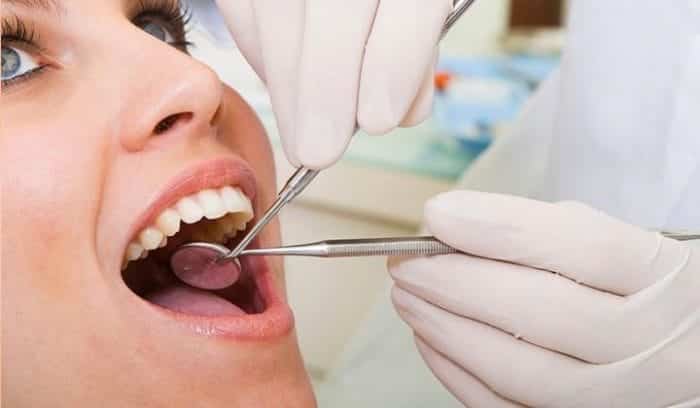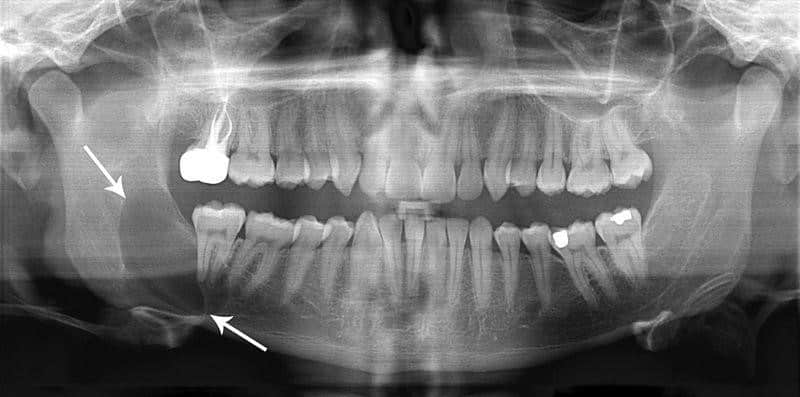You went to the dentist and discovered that you have a dental cyst? Now what?
The first thing you should do is remain calm. Most cysts, when they first begin to form, are free of any infection. As long as a dental cyst is treated early, your oral health should remain in tip-top condition.
However, if the dental cyst has been given time to grow without treatment, your dentist will recommend the proper course of action. Here is what you should know about dental cysts, and the various treatment options available.
What Is a Dental Cyst?
A dental cyst is very much like a closed sack. What is inside the sack can differ from patient to patient. Some cysts are comprised of air, some of the soft tissue, and others are filled with fluid that can build up next to and around teeth. A dental cyst left to grow without treatment can lead to severe problems for your oral health.

Where Are Cysts Found?
There are various types of dental cysts.
Periapical Cysts: These cysts form at the root tip, and are typically caused by trauma, a crack in the tooth, or decay that has infected or killed the nerve (pulp) of the tooth.
Dentigerous Cysts: These cysts grow around unerupted or partially-erupted teeth, particularly wisdom teeth.
Keratocysts: These cysts typically form due to trauma or genetics. These cysts are aggressive and exhibit a high rate of recurrence, even after surgical removal.
A patient with a keratocyst, which can lead to a weakening of the jaw. The slightest trauma could cause breakage.
Periodontal Cysts: These types of cysts are caused by advanced periodontal or gum disease, and thus are bacterial in nature.
As mentioned previously, when a cyst first forms, it is infection-free and pain-free, in most cases. You can sometimes see them with a visual examination, but they can also show up with a tissue examination and on X-rays taken by your dentist.
Potential Oral Health Problems
As any orthodontist will tell you, teeth respond to pressure. Put pressure on teeth in the right ways, and you can improve a patient’s smile. A cyst left to grow can create unwanted pressure on teeth that can have the opposite effect on your smile. For example, a worsening cyst can eventually affect your bite by moving teeth, change the way you chew and digest food, and weaken the jawbone. In extreme cases of undetected cysts, the jawbone can actually be put at risk for fracture, among other complications.
Furthermore, a dental cyst can become infected and can eventually develop into an abscess, or pus-filled sack, which can spread the bacterial infection throughout your body.
Now that we have determined that cysts are bad, how will your dentist treat the cyst found in your mouth?
How to Treat Dental Cysts
The dental cyst will first require a thorough examination by your dentist or maxillofacial surgeon. The type of treatment used will depend on the type of cyst as well as where it’s located.
A cyst that forms on the root of a tooth might require endodontic or root canal therapy in order for the cyst to begin the healing process.
But, if the cyst has existed for some time, and if the patient’s immune system is compromised for any reason, the cyst can swell, making the tooth throb and become painful to the touch. That’s when tooth extraction or root canal therapy remain the only two viable options.
Regular Dental Checkups Are Key to Prevention
Dr. David Brusky urges all of his patients to schedule regular checkups at least twice-yearly to help identify dental cysts early.
Since the cysts are usually asymptomatic when they first develop, you may not even know one is there until Dr. Brusky takes X-rays. It is important to work with your dentist to treat the dental cyst as early as possible. This will help to prevent any long-term effects and preserve your dental health.
Schedule your regular appointment today by calling The Center for Dental Excellence.
↓







I had my dental cyst removed 5 months back. What are the chances of recurring? Though my OPG Xray says that its healing well, as said by my surgeon, but still now there is slightly an uncomfortable feeling, like there is slightly holding my gum area where the cyst existed. The surgeon did not graft any bone, he had just removed the cyst which was 1 dollar coin size. So does the bone area in the gum grow by itself?
I have a dental cyst and I just got it checked out I was wondering how long can I leave it and will it become cancerous, we can’t afford an extraction yet but I’m scared to wait
I want the abscess removed from the previously done with root canal treated tooth.
please let me know the cost